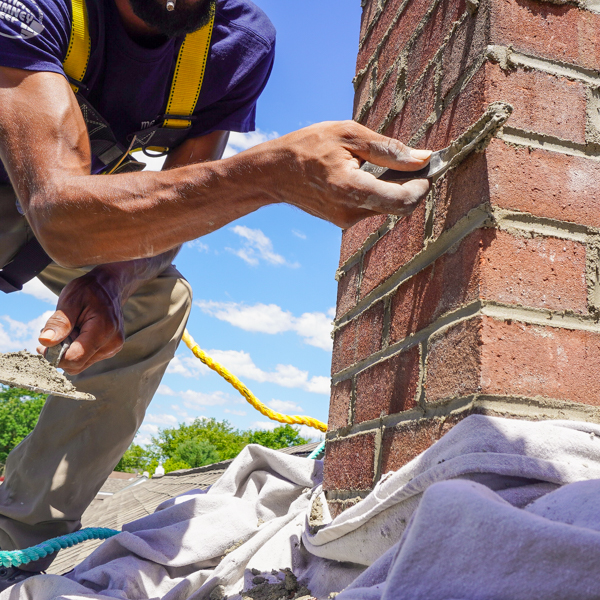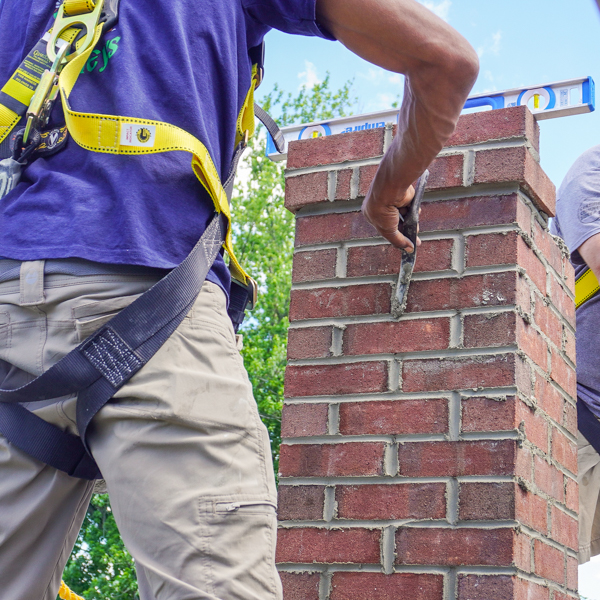Does My Chimney Need Tuckpointing or Repointing?
Many people think tuckpointing and repointing are the same thing, but while they’re similar masonry techniques, there are situations where one is preferable to the other.
 What’s the Difference Between Tuckpointing and Repointing?
What’s the Difference Between Tuckpointing and Repointing?
Tuckpointing and repointing are masonry repair techniques used to replace the damaged or missing mortar between bricks, stones, or other masonry components.
The main difference between the two is in the appearance of the finished repair. Tuckpointing involves removing the damaged mortar to a depth of about 1/2 inch and refilling the joint with a contrasting color mortar to create a decorative, “tuckpointed” look.
Repointing involves removing the damaged mortar and replacing it with new mortar that matches the color and texture of the existing mortar. The goal of repointing is to restore the structural integrity of the masonry and maintain its original appearance.
Which Technique Is Right For You?
The short answer is: It depends on what you want to achieve. For example, homeowners generally choose repointing when a chimney’s mortar joints are badly degraded, and they aim to shore up its structural integrity. However, a person who owns a historic home or building may opt for tuckpointing to restore the chimney’s original look.
Of course, the repair method depends on other factors, like your budget and the extent of the damage. Typically speaking, repointing is less expensive because it’s less involved, while tuckpointing requires a certain skill level and artistry to ensure you maintain the chimney’s look. The best way to determine what method is right for you is to consult a chimney professional and discuss the chimney damage and your repair options.
How Do I Know If My Chimney Needs Tuckpointing or Repointing?
Most people don’t get on the roof to inspect their chimneys, so it’s not always apparent when there are problems, which is why it’s recommended that you hire a professional chimney service for an annual inspection. However, there are a few signs that signal your chimney is deteriorating.
Cracks in the Mortar Joints
Masonry materials wear out over time because they’re exposed to harsh weather. Once mortar joints start cracking, they won’t stop until they fall apart. A good rule of thumb says that if the cracks in the joints are 1/4 inch or larger, you need repairs.
Deteriorated Mortar
Unfortunately, cracks aren’t the only concern affecting mortar joints; they’re also prone to deterioration. If your mortar is discolored or flaking away, it must be replaced as soon as possible.
Leaks
Water is the number one enemy of your chimney. Once cracks form and water seeps in, the damage from a leaky chimney will escalate and result in your chimney collapsing if you don’t take care of it.
Your Chimney Looks Worn Out
Finally, if your chimney looks like it’s seen better days, repointing or tuckpointing will freshen it up and increase your home’s curb appeal.
Common Causes of Chimney Damage
Many factors play a role in chimney and mortar deterioration, including:
Weathering Exposure
Continuous exposure to the elements, such as rain, snow, and extreme temperatures, can cause the mortar to expand and contract, leading to cracks and deterioration over time.

Freeze-Thaw Cycles
When water gets into the mortar joints and freezes, it can cause the mortar to crack and break apart. If you live in an area where harsh winters are the norm, your chimney is vulnerable to freezing and thawing and the damage it causes.
Poor Construction
Sometimes, contractors make mistakes or cut corners when building a chimney. Whether they don’t mix the mortar correctly or perform a sloppy job, it can cause the chimney to break down more quickly than it should.
To keep your chimney in tip-top shape and repair minor issues before they worsen, call Mercer County Chimney Services in Hamilton, NJ, and Mercer County for annual inspections and maintenance.
Our technicians are licensed and certified by the Chimney Safety Institute of America and the National Fireplace Institute. Schedule an appointment today by calling 609-802-5288.


